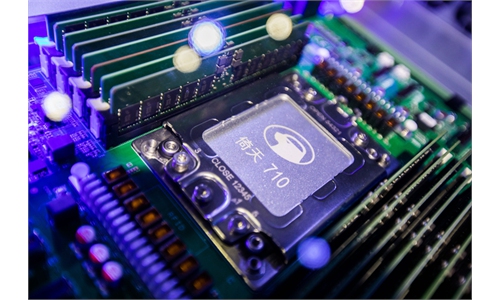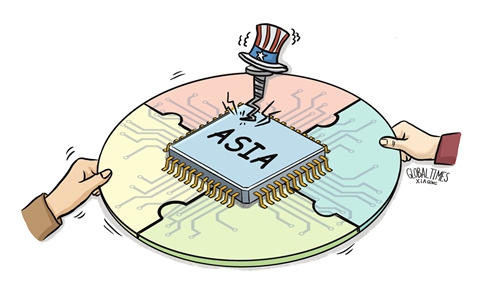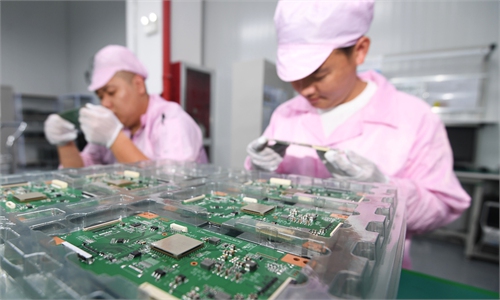COMMENTS / EXPERT ASSESSMENT
EU’s semiconductor race needs Chinese market

Illustration: Tang Tengfei/Global Times
The EU was scheduled to announce a plan on Tuesday to boost its local semiconductor production with an investment of 42 billion euros ($48 billion), joining the chips race which may shape up the global landscape for economic development in the digital era.
With a goal of doubling Europe's semiconductor capacity from 10 percent of the world's value today to 20 percent by 2030, the plan named European Chips Act will "position Europe as an industry leader but also give [Europe] complete control of [its] semiconductor supply chains," French news agency AFP reported, citing Thierry Breton, the EU's industry commissioner.
Once an industrial frontrunner, the EU's move in rolling out an ambitious plan is understandable; however, it will be anything but an easy mission for the bloc against the backdrop of the current gloomy global economy and a transformation of the global chip industrial development pattern.
Instead of competing with China or the US, as many suggested, seeking cooperation with China would be a better choice for Europe which has lagged behind in the chip field. In 1990s, Europe claimed over 40 percent of the chips sector's global market share, according to media reports. The drastic decline to 10 percent has its own economic logic and reasons, including an overall hollowing out of manufacturing and the rapid fading of Europe's mobile phone industry.
In an era of globalization, semiconductor is one of the industries that have experienced the most comprehensive global division of labor, with the US holding an advantage in upstream technology and Asian region holding an advantage in manufacturing, leading by the island of Taiwan, South Korea and the Chinese mainland.
However, after the global division of labor phase, the development of the chip industry has ushered in a new crucial revolution, in which governments are playing a more active role. Major economies are viewing semiconductor as a strategic industry and scrambling for a more independent capacity in the field, especially in light of the COVID-19 pandemic triggering supply chain interruptions and the US wantonly disrupting the global industrial chain so as to maintain its technological hegemony.
Facing the US government's vicious restrictions and crackdown in high-tech sectors, China and Chinese firms, surely, have accelerated the development of its own capacity in the semiconductor industry. South Korea rolled out a plan in May 2021 with an aim to build the world's largest semiconductor manufacturing base by 2030.
Though major players are seeking to set up a more independent capacity in the chip industry, the trend toward globalization will not be reversed and Washington's hegemonic manipulation over the industrial chain under a Cold War mindset will not succeed.
China's development in the semiconductor area will not be stifled, not only because that the nation has made great progress in high-tech development and has become frontrunner in many areas, but also due to its unrivaled market size which offers the exact soil to cultivate new technologies.
In this sense, the EU and China have complementarities in the path of boosting the development of their semiconductor and related areas. Many European industries have realized great growth based on their cooperation with China; likewise, the Chinese market, as the largest chips importer, is crucial for the EU's ambitious chips plan of doubling its market share.
One thing that needs to be pointed out is that the mutually beneficial cooperation between China and the EU is not going to be free of interference, especially from the hegemonic US which has been luring others into its anti-China clique. But it is always the "America first" principle that is behind the US' rhetoric, and the EU should not be hijacked by US politicians' selfish policies. Cooperation will always be the main theme of the China-EU relations.
The author is a reporter with the Global Times. bizopinion@globaltimes.com.cn



